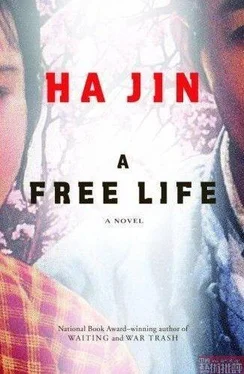One night the Wus returned from work and found that a window in the bedroom used as Nan 's study was open. At once Nan flicked on all the lights to see what was missing. The computer and the microwave were gone; so was a pair of Pingping's leather sandals. Other than those, they had lost nothing else. How fortunate it was that they'd kept all their papers in their safe-deposit box in the bank. On the carpet of the living room two pairs of muddy shoe prints stretched parallel to each other, one under eight inches long and the other about a foot. Apparently two people, a grown-up and an adolescent, had committed the burglary. At first, both Nan and Pingping were outraged and cursed the thieves. They wondered whether they should report the crime to the police, but eventually decided not to. The police might summon them to the station, and they didn't want to go through the tedious process. They couldn't afford to lose a whole morning, plus probably a good part of an afternoon. Actually, their loss was minimum, as both the computer and the microwave were already broken. Having calmed down, they couldn't help smiling, amused that the thieves had made fools of themselves and must be racking their brains trying to make those machines work.
"I'm pleased they removed the junk. Good riddance," Nan said. " I want my computer back," wailed their son. "It was already broken down, not worth keeping anymore." "I want it back. It's mine."
His mother stepped in. "Be reasonable, Taotao. This way we won't have to bother to dump them. We just paid those fools a pair of my old shoes."
"It's my computer."
"All right, once we have our own home, we'll buy you a new one," Nan said.
"When can we have our house? I don't want to live here anymore."
His parents looked at each other. Nan realized Pingping was thinking the same thought. He managed to answer his son, "I'll start looking for a new place soon."
"Yes, Daddy will take care of that," Pingping said. "You must stop hoarding things."
Neither Nan nor Pingping could say when Taotao had become a hoarder: he had never let go of anything that once belonged to him, not even a pencil stub or a paper clip. For some time his parents had wondered what was wrong with him. Then one day back north, on his way to work in Natick, Nan by chance listened to a psychiatrist on the radio discussing the psychology of hoarding with a caller whose son had the same problem-"a real dog in the manger," the boy wouldn't even let his newborn cousin wear the booties he had outgrown long ago. The man and his wife had been separated, and the psychiatrist said their shaky marriage might account for their son's obsession-unconsciously the boy wanted to hold things together. The thought came to Nan that Taotao must have been frightened all these years when Pingping and he were often absent from his life. Now the boy must still be afraid of losing his parents, and this fear was manifested in his clinging to all trifles. Look at his duffel bag, full of trinkets: assorted batteries, dead wrist-watches, rulers, a shoehorn, key chains, dog tags, pencil sharpeners, baseball cards, seashells, coins from various countries that Livia had given him. He had even saved every section of comics from the Boston Globe back in Massachusetts; his parents had forced him to dump them before the move, but now he had begun collecting the funnies from the Atlanta Journal-Constitution. What puzzled Nan was that Taotao never looked at those pages again once he had thrown them into the pile in his closet, next to the carton containing issues of National Geographic, which his parents had subscribed to for him. The boy's hoarding saddened his parents. Nan and Pingping agreed not to talk about their marital trouble in front of their child again.
"I wonder why the thieves didn't take Taotao's telescope," Pingping said to Nan when the boy was brushing his teeth in the bathroom.
"The computer must have seemed worth a lot of money to them."
"If they'd walked off with the telescope, that would have killed him."
"Maybe we should store it in the restaurant."
So they took the thing along when they went to work the next morning. For the whole day Nan continually looked through apartment books and the "Home Finder" sections of the Sunday Atlanta Journal-Constitution for a safe nearby place, but he couldn't find one. There were a few houses listed for rent in Lilburn, all too expensive.
To Nan's delight, Mrs. Wang showed up the next afternoon and said that she and her husband were going to visit their relatives in Taiwan for at least three months. She would be happy to let the Wus "keep the house" for them. Nan and Pingping understood that also meant she'd want them to pay some rent. They offered her six hundred dollars a month, which Mrs. Wang happily accepted. "Nan, we trust you like a son of ours," she said with feeling.
Her words made Nan 's gums itch, knowing the Wangs had no son. But Pingping tittered and asked her, "Then I'm your daughter-in-law, right? And Taotao is your grandson, right?"
" Right."
"Then you should let us use your house for free, shouldn't you?"
Mrs. Wang looked baffled; her small eyes dimmed while a wormlike frown gathered at her forehead. Pingping said, "Just joking. We'll take good care of your house."
Nan was worried that the managerial office at Peachtree Terrace might not let him get out of the lease easily. He talked to Shona, the black woman in charge of the apartment complex, and she agreed to cancel his lease provided Nan was willing to lose the security deposit. He was unhappy but had no choice. However, a week after the Wus had moved out, Nan received a check of $275 from Shona. She didn't write a word and just refunded him half the deposit, which pleased the Wus.
Since moving into the Wangs', the Wus hadn't been able to figure out what the little red flag on the mailbox was supposed to do. Back in Massachusetts, the Masefields hadn't had such a thing on their box, and Heidi had always taken her mail to the post office. Now every morning before going to work, Nan would raise the tiny flag as a way to greet the postman, who drove on the right-hand side of his van. Then one day Pingping found a slip of paper in the mailbox, bearing these words: "Don't let your kids play with the flag! Keep it up only when you have mail to go."
Taotao loved the Wangs' house and often set up his telescope in the backyard at night to look at stars. He was happy that at last he could use the instrument freely. His parents joined him in observing the sky a few times, but unlike in the Northeast, the air in Atlanta was still a touch humid in the fall, so even such a large telescope, 225 power, couldn't penetrate the hazy atmosphere completely. Tao-tao once sulked and kept twisting the focus knob and the eyepiece. Nan told him, "The sky will be clear in the wintertime. Why don't you wait until then? I bet you can see stars clearly when it's cold."
The boy agreed and stowed away the telescope in a closet. However, when winter came, he didn't take it out. In fact, the frustration in the fall had squelched his craving for stargazing. He'd never touch the telescope again, as if it was just a toy he had outgrown but still wanted to keep.
BOTH Nan and his wife often dreamed of their native land. Yet neither of them missed their parents a lot, because they had grown up in kindergartens and boarding schools. Unlike Nan, Pingping sometimes remembered her father fondly. She didn't love her mother that much; she had been grouchy, especially when frustrated at work, and had often vented her frustration on her children. As the oldest child, Pingping had to do many of the household chores and look after her siblings. Her mother would scold her if she didn't rinse the laundry clean enough, and would even slap her if her siblings had fought with other kids whose mothers came to complain and make scenes. So Pingping had never missed her mother. Every so often, she still dreamed of China, but in the dream she was sometimes tormented by a full bladder; she'd toss in bed and shout, "Where's the toilet?" A few times she awakened Nan, who slept in the other bed in the same room.
Читать дальше












